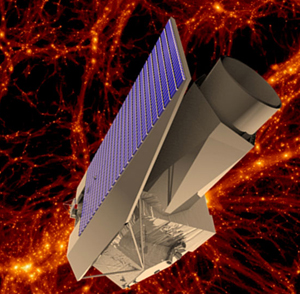'Dark energy' and 'dark matter' the focus of the Euclid space mission
The future European space mission, Euclid, which the European Space Agency has just selected for launch in 2019, will have prominent Danish participation. Euclid is designed to provide a quantum leap forward in our understanding of the ‘dark energy’ that makes up 70% of the energy density in the universe and causes it to expand faster and faster. The Nobel Prize in Physics 2011 is going to the research team that discovered this utterly surprising property of the universe in 1998.
 Space Science Center at the University of Copenhagen and DTU Space have teamed up to contribute to the design of the instruments. In return, Danish researchers will have unrestricted access to the Euclid mission’s goldmine of data.
Space Science Center at the University of Copenhagen and DTU Space have teamed up to contribute to the design of the instruments. In return, Danish researchers will have unrestricted access to the Euclid mission’s goldmine of data. Space Science Center at the University of Copenhagen and DTU Space have teamed up to contribute to the design of the instruments, supplying parts to test the instruments, and participate in the testing of the instruments before the launch. In addition, a portion of the data analysis from the satellite will be undertaken at a new Danish data centre in collaboration with the Department of Computer Science at the University of Copenhagen.
The University of Copenhagen is thus taking a new step into space, because for the first time it is providing a major contribution to the instruments on a satellite mission to explore the universe. In return, Danish researchers will have unrestricted access to the Euclid mission’s goldmine of data.
New light on the dark universe
"In addition to studying dark energy, Euclid will also shed important new light on the universe’s ‘dark matter’, which does not emit light, but binds the galaxies and galaxy clusters together. Understanding the nature of dark energy and dark matter are currently some of the most important scientific challenges. Euclid’s measurements will provide groundbreaking insights into astronomy and fundamental physics”, explains astrophysicist at the Niels Bohr Institute, Kristian Pedersen, who heads the Space Science Center , an interdisciplinary centre consisting of 10 research groups at the University of Copenhagen.
Euclid will observe several hundred million galaxies across a large part of the sky over 6 years. The observations will be used to measure the fingerprint of dark energy, dark matter, and gravity on the geometry of the universe and the evolution of galaxies. By measuring the form of the galaxies and the distribution of galaxies in space, astronomers will measure the effect of dark energy, and whether Einstein’s general theory of relativity holds at such great distances as billions of light years.
The Euclid satellite has a space telescope on board and is equipped with a camera that will record visible light and an instrument that will record images and spectra in near-infrared light. Euclid is lead by Prof. Yannick Mellier from Institut d'Astrophysique de Paris and more than 800 researchers from 12 European countries are taking part. 20 Danish researchers and 5 engineers and technicians from the Dark Cosmology Centre, Niels Bohr Institute, DTU Space, National Space Institute, Department of Physics and Astronomy, Aarhus University, and the Department of Computer Science at the University of Copenhagen are already involved in Euclid.
